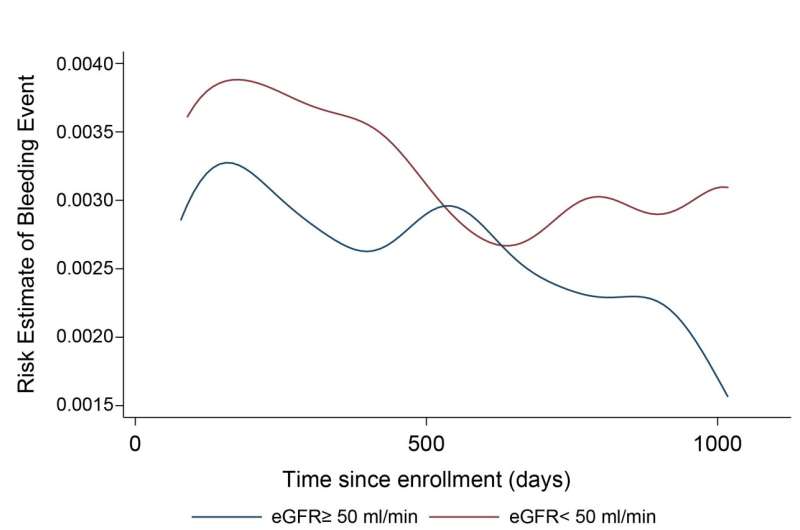Reduced kidney function increases bleeding risk in antithrombotic therapy

Antithrombotic therapy is prescribed to prevent thrombotic (blood clotting inside a blood vessel) events but the treatment also increases the likelihood of experiencing a bleeding event, which can be extremely serious if it occurs in a vital organ. Aging societies tend to have an increased number of patients undergoing antithrombotic therapy, and the drugs used in this treatment can affect kidney function. In particular, reduced kidney function caused by antithrombotic medications can significantly influence bleeding events. It is highly recommended that patients, especially those with decreased kidney function, have a detailed discussion with their doctor about the possible risks and benefits of proceeding with antithrombotic therapy.
Patients with heart arrythmia (atrial fibrillation) have a high risk for thrombotic events in blood vessels that could lead to permanent organ damage—such as cerebral infarction—and are prescribed antithrombotic therapy to lower their risk of developing blood clots. However, the risk of bleeding events simultaneously increases due to the nature of these medications. The severity of these bleeding events is highly variable, ranging from epistaxis (nosebleeds) to fatal brain hemorrhage.
While kidney function is known to be related to bleeding event risk, researchers at Kumamoto, Miyazaki, and Tohoku Universities in Japan conducted a post-hoc subgroup analysis of the Atrial Fibrillation and Ischemic Events with Rivaroxaban in Patients with Stable Coronary Artery Disease (AFIRE) trial to determine the impact of kidney function on the risk of recurrent bleeding events during antithrombotic therapy. Their analysis revealed that the effect of kidney function on recurrent bleeding risk events was quite large for patients undergoing this treatment. They also found that the bleeding risk decreased with time for patients with healthy kidney function but remained high for patients with decreased kidney function. Clearly, the decision to use such a therapy should be balanced between the expected antithrombotic effects and bleeding risks.
In most cases, it is considered better to continue antithrombotic therapies even after bleeding events as long as the event was not severe. However, it is not surprising that both patients and physicians hesitate to continue the therapy after any bleeding event. To assess for drug safety and efficacy, these drugs are usually measured by the numbers of bleeding and thrombotic events. Unfortunately, in the assessment of antithrombotic therapy, most studies only consider the first event in their analyses even though patients could experience multiple events throughout their lifetime. This study revealed that the impact of kidney function on bleeding risk during antithrombotic therapy is larger than estimated in previous studies. Furthermore, patients with healthy kidney function appear to have a decreased risk of experiencing a bleeding event over time, but the risk for patients with reduced kidney function remains high as time continues.
"A detailed discussion between patients and physicians based on all current scientific evidence about the risks and benefits of antithrombotic therapy is highly recommended," said study leader Dr. Kunihiko Matsui of Kumamoto University Hospital's Department of General Medicine and Primary Care. "Our analysis should be quite useful in facilitating this type of discussion."
More information: Kunihiko Matsui et al, The impact of kidney function in patients on antithrombotic therapy: a post hoc subgroup analysis focusing on recurrent bleeding events from the AFIRE trial, BMC Medicine (2022). DOI: 10.1186/s12916-022-02268-6



















